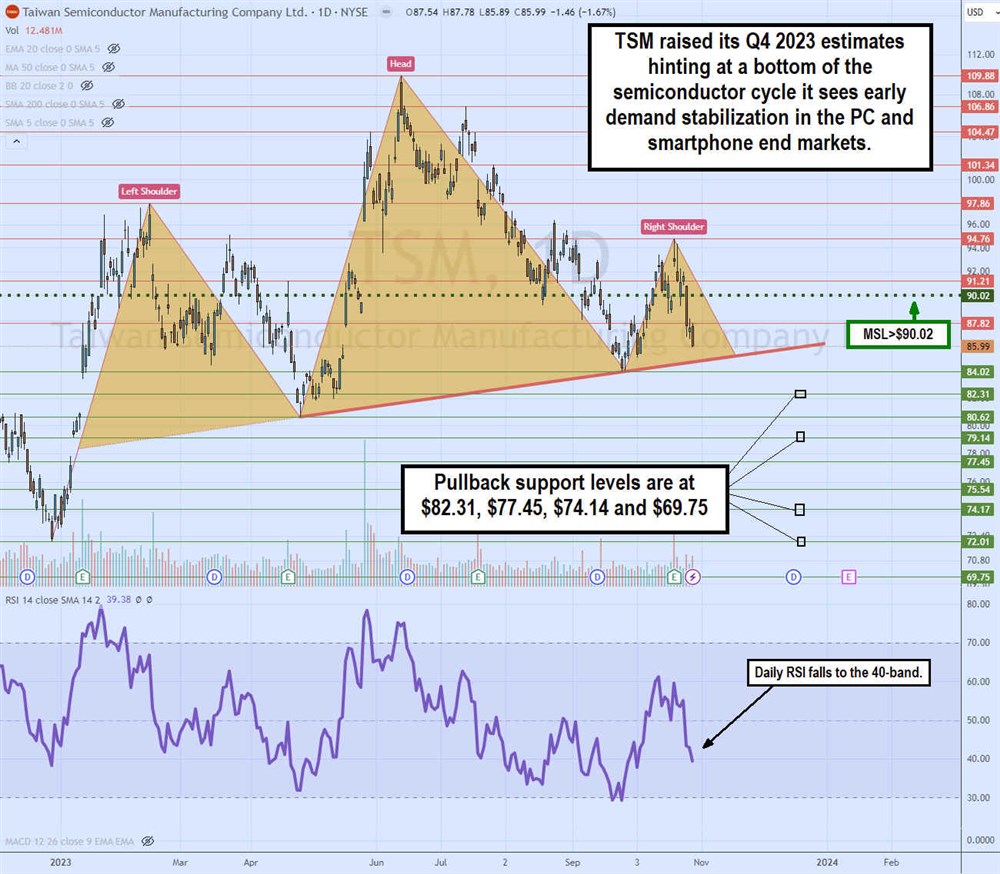![]()
The world's largest dedicated semiconductor foundry, Taiwan Semiconductor Manufacturing Co. Limited (NYSE: TSM), is critical to the global chip supply chain. The company produces 80% of the world's semiconductors and is the barometer of the chip industry. Some of its largest customers include Advanced Micro Devices Inc. (NYSE: AMD), Broadcom Inc. (NASDAQ: AVGO), Apple Inc. (NASDAQ: AAPL), Qualcomm Inc. (NASDAQ: QCOM) and NVIDIA Co. (NASDAQ: NVDA). Its chips are used to power data centers, smartphones, artificial intelligence (AI) applications, consumer electronics and high-performance computing (HPC) systems. Despite falling revenues, the company reported strong Q3 2023 results but raised its Q4 revenue guidance above forecasts.
The profit machine
On October 19, 2023, Taiwan Semiconductor released its fiscal third-quarter 2023 results for the quarter ending September 2023. They reported an earnings-per-share (EPS) profit of $1.29 versus consensus analyst estimates for a profit of $1.15, a 14-cent beat. Revenues fell 14.6% YoY but rose 10.1% from the previous quarter to $17.28 billion, beating analyst estimates for $16.9 billion. Gross margin was 54.3%. Operating margin was 41.7%. The net profit margin was 38.6%. Smartphone and Internet of Things (IoT) platforms grew by 33% and 24% quarter over quarter. This was driven by the Apple 3-nanometer iPhone 15 launch in September 2023. PCs and smartphones are two of the biggest segments.
Revenue split
Its shipments were split between 3-nanometer comprising 6%, 5-nanometer comprising 37%, and 7-nanometer accounting for 16% of total wafer revenue. Advanced technologies comprised 59% of total wafer revenues. Advanced technologies are defined as 7-nanometer or more advanced technologies.
Raising the bar
Taiwan Semiconductor raised its Q4 2023 revenue guidance to $18.8 billion to $19.6 billion versus $18.54 billion. Gross profit margin is expected between 51.5% to 53.5%. Operating profit margin is expected between 39.5% to 41.5%.
CEO insights on inventory reduction and demand stabilization
Taiwan Semiconductor CEO Dr. C.C. Wei acknowledged that AI-related demand remains robust. However, he noted that it was "not enough to offset the overall cyclicality" of its business. They expect the ramp of its 3-nanometer technology to support its Q4 2023 business.
The company expected inventory to continue to reduce in the quarter. However, the "persistent weak overall macroeconomic conditions" and slow demand recovery in China caused customers to remain cautious with inventory control. Inventory "digestion" is still expected in Q4 2023. He commented, "Having said that, we are observing some early signs of demand stabilization in the PC and smartphone end market. With such inventory control, we forecast the fabless semiconductor inventory to further reduce and exit 4Q '23 at a healthier level."
Global fab expansion
Taiwan Semiconductor will build a specialty technology fab in Dresden, Germany. This plant will focus on semiconductors for automotive and industrial applications. It will utilize 22- and 28-nanometer and 12- and 16-nanometer technologies for wafer fabrication. Construction is scheduled to commence in the second half of 2024, with production starting in late 2027. The company continues to receive strong support in Phoenix, Arizona, for its Arizona fab operations and has hired 1,100 employees to date.
Many new employees have been flown to Taiwan for extensive hands-on training. The company is targeting early 2025 to begin volume production of its N4 process technology. Overseas fabs cost more than those made in Taiwan due to smaller fab scale, higher supply chain costs and new ecosystems compared to the matured ecosystem in Taiwan.
N2 technology will accommodate AI and HPC demand.
The surge in AI is driving the demand for energy-efficient computing. It requires earlier engagement. The company will release its 2-nanometer technology in 2025. It will be the most advanced semiconductor technology in the industry for density and energy efficiency. Volume production is expected to start in 2025. Its N2 technology platform is the best suited for AI and HPC applications.
Analyst actions
Bank of America maintained its Buy rating but raised its earnings estimates after Taiwan Semi's earnings were 8% higher than expected. Analyst Brad Lin stated, "Management looks optimistic on 2024 recovery as inventory digestion approaches the end, rush order increases, and PC/smartphone demand stabilizes." Barclays started coverage with an Overweight rating and a $105 price target. Goldman Sachs upgraded TSM to a Conviction Buy from Buy with a $115 price target.
Taiwan Semiconductor analyst ratings and price targets are at MarketBeat. Taiwan Semiconductor peers and competitor stocks can be found with the MarketBeat stock screener.

Daily head and shoulder pattern
The daily candlestick chart on TSM indicates a head and shoulders pattern. The left shoulder peaked at $97.08 and fell to a neckline trendline at $80.62. The head peaked at $109.88 and fell to the neckline trendline at $84.02 before bouncing to the peak of the right shoulder on October 19, 2023. Shares have fallen under the daily market structure low (MSL) buy trigger at $90.02. The rising neckline is the last line of defense at $84.75 to prevent a breakdown. The daily relative strength index (RSI) has fallen to the 40-band. Pullback support levels are at $82.31, $77.45, $74.14 and $69.75.